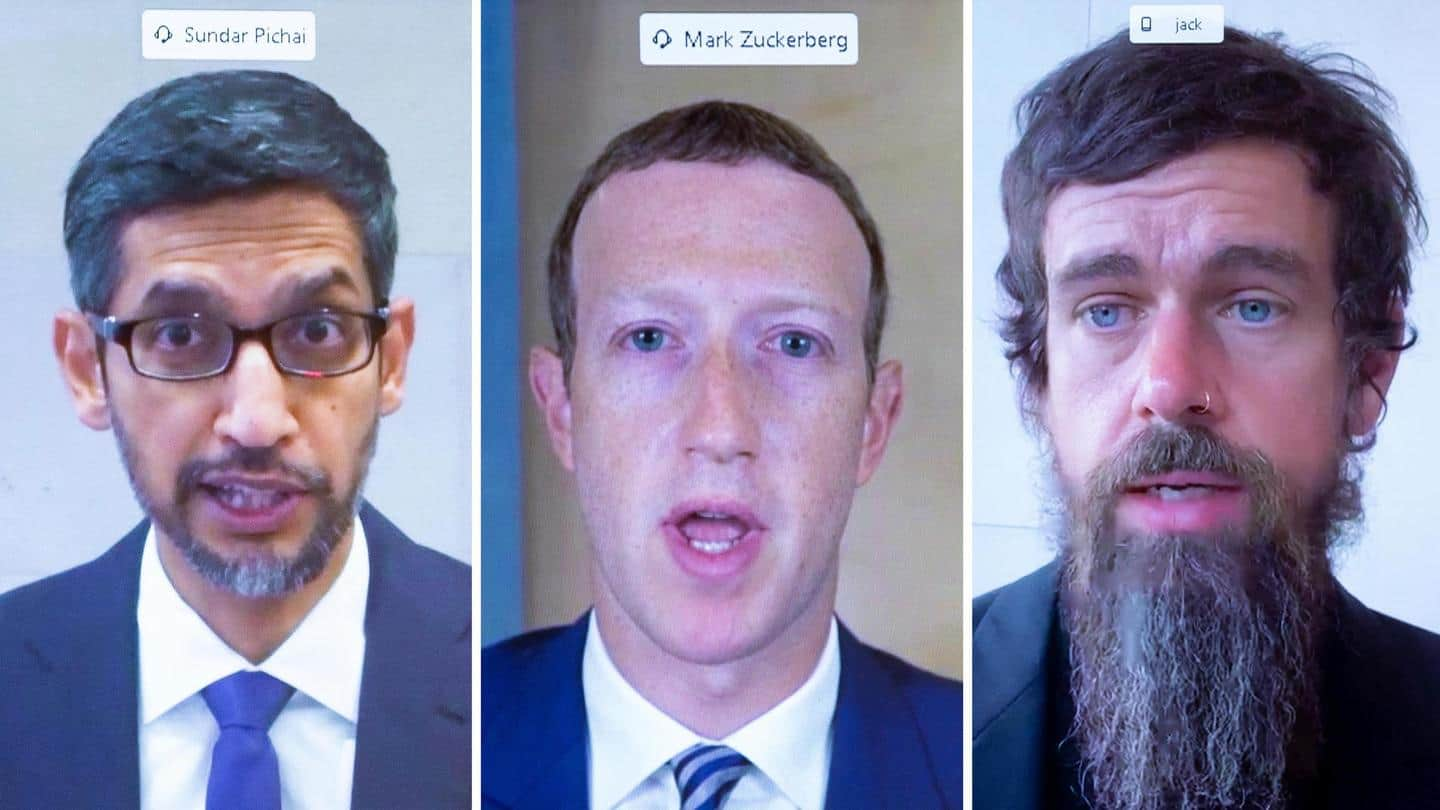
Congress' five-hour questioning of Big Tech didn't yield actionable answers
What's the story
In the first appearance before Congress since the US Capitol Hill riots, Big Tech faced criticism for around five hours about its handling of extremism and misinformation during the pandemic and the protests.
However, Facebook boss Mark Zuckerberg, Google CEO Sundar Pichai, and Twitter CEO Jack Dorsey were reluctant to answer questions from both Democrats and Republicans with a simple "yes" or "no" answers.
Opening remarks
Democrats attempted to hold companies responsible for Capitol Hill events
In his opening statement, Representative Mike Doyle said that the Big Tech's platforms suggest groups for people to join, videos they should watch, and posts they should like.
This drove the movement that motivated the Capitol Hill events with "terrifying speed and efficiency," he added.
Doyle and other Democrats attempted to make the CEOs admit their platforms bear responsibility for the events.
Twitter Post
Representative Anna Eshoo demands Zuckerberg to answer 'yes' or 'no'
Today I spoke with the CEOs of @Google, @Twitter and @Facebook about how their platforms amplify extremism and enable misinformation to thrive at great costs to society.
— Rep. Anna G. Eshoo (@RepAnnaEshoo) March 25, 2021
These companies are not doing enough to protect their users and our democracy. They must be held accountable. pic.twitter.com/YyNDoBDkS0
On the back foot
Zuckerberg admitted Facebook hosted "problematic" content posted by rioters
While Dorsey acknowledged some responsibility, Zuckerberg and Pichai didn't address the question directly. Later in the hearing, Zuckerberg did admit that Facebook had hosted "problematic" content from some rioters.
The questioning followed on the lines of the House antitrust panel's upcoming set of legislations targeting Section 230 that intend to hold Big Tech accountable for the content posted on their platforms.
Ambiguity
Lawmakers annoyed by CEOs' refusal to answer straight
Like recent hearings, the format made it nearly impossible to obtain meaningful answers. Lawmakers were allotted five minutes each to question the CEOs.
Representative Anna G. Eshoo interrupted Zuckerberg to emphasize that "no one seems to know the word yes and the word no".
Representative Billy Long also asked each CEO individually if they knew the difference between yes and no.
Dilly-dallying
Dorsey sarcastically congratulated for 'multitasking' during hearing
Since the answers were ambiguous and lawmakers repeated questions, the CEOs' opening statements provided more detail on issues than anything they said in the five hours that followed.
Interestingly, Dorsey was active on Twitter during the hearing. He even liked a post questioning why lawmakers refused to learn to pronounce "Pichai". Later, he was sarcastically congratulated by Representative Kathleen Rice on his multitasking abilities.
Bipartisan support
Both sides seemingly agree Section 230 must be revamped/scrapped
It is becoming increasingly clear that the government will pass laws to regulate Big Tech.
The legislations being drafted by the antitrust panel seem to have bipartisan support. President Joe Biden has also indicated that he supports a full repeal of Section 230.
Meanwhile, Senator Chris Coons recently told Politico that the Senate could summon Dorsey and Zuckerberg for another hearing on misinformation, algorithms, and privacy.
New federal agency?
Facebook suggests Section 230 grant immunity if posts are removed
However, on Wednesday, Facebook released a written testimony suggesting Section 230 be redone to grant companies immunity from liabilities arising from users' posts only if they follow best practices for removing such material, Reuters reports.
Following the hearing and speaking to Bloomberg TV, Representative Doyle proposed another idea of a new federal agency with rule-making authority and real teeth to regulate the internet platforms.
Twitter Post
Representative Mike Doyle's conversation with Bloomberg TV following the hearing
"Congress is ready to regulate."
— Bloomberg TV (@BloombergTV) March 25, 2021
U.S. Rep. Mike Doyle, who led the hearing with the CEOs of Facebook, Twitter and Google, tells @emilychangtv both parties have found common ground in how to reform and regulate the social platformshttps://t.co/wGf8c87vLk pic.twitter.com/o5D4UGQwrB